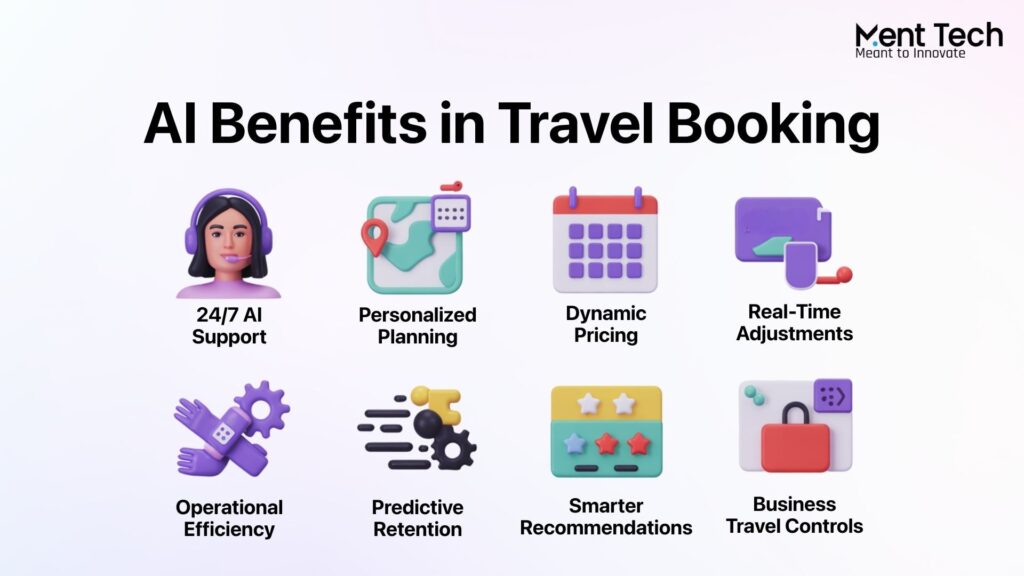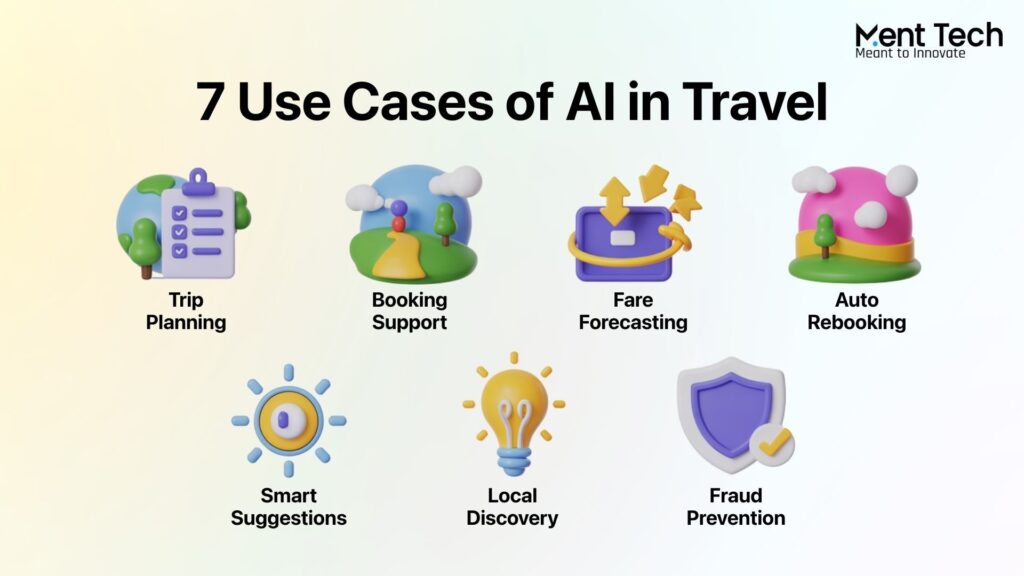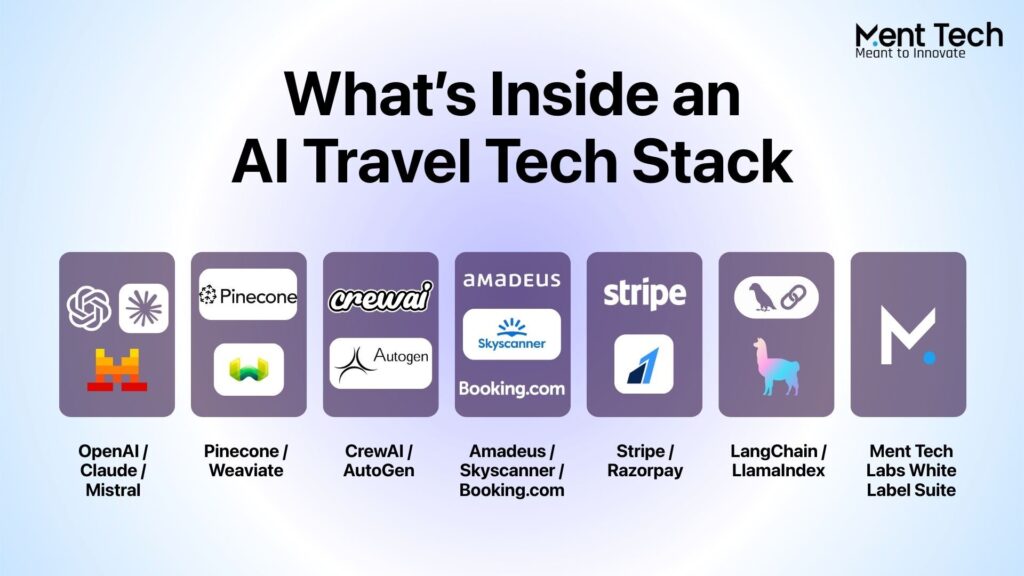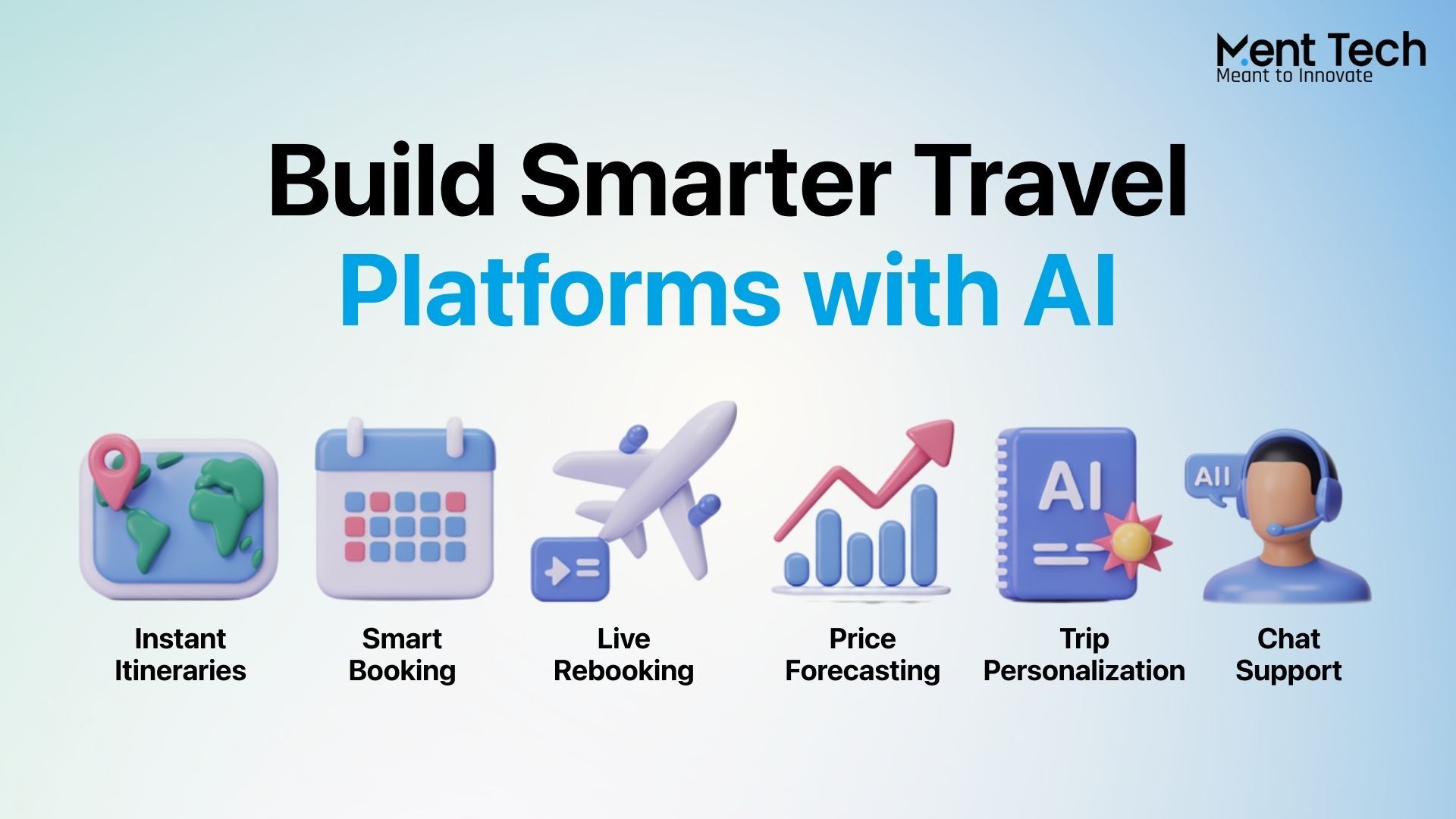You’ve probably felt it without even realizing. The way your flight options show up faster. The way a chatbot helps you rebook after a delay. The way your hotel suggestions just seem to fit. It’s not magic. It’s AI working quietly in the background.
A 2025 report from Relocate Global and the TravelTech Show found that over 58 percent of travel buyers are increasing budgets for AI in the travel industry, with a clear focus on booking engines, planning tools, and automated customer support.
This shift is visible across platforms already in use. Hopper relies on machine learning to predict flight and hotel prices. Expedia uses large language models to help users create personalized travel plans. Google Travel now builds full trip summaries based on email receipts and calendar data.
As more platforms adopt AI in travel and tourism, the role of human agents continues to shrink. Users now expect instant recommendations, flexible planning, and seamless changes without picking up the phone.
This blog explains how AI in the travel booking ecosystem actually works. It covers the benefits, explores real product use cases, breaks down cost structures, and outlines the core technologies behind modern booking systems.
Core Benefits of AI in the Travel Industry

As travelers become more mobile and expectations grow, the use of AI in the travel industry has become a practical necessity. Leading travel platforms now rely on AI not just to automate but to improve the entire user experience from search to post-trip engagement.
Below are the most valuable, human-centered benefits that businesses are realizing today.
1. 24/7 Booking and Support with AI Chatbots
AI chatbots for travel booking enable platforms to respond instantly to user requests, questions, and problems across all time zones. This reduces dependence on live agents and ensures no user is left waiting for basic support.
2. Personalized Travel Planning at Scale
AI in travel planning helps surface relevant destinations, hotels, or activities based on user preferences, search behavior, past trips, and even seasonal trends. This level of precision boosts user engagement and drives faster decisions.
3. Smarter Pricing and Fare Forecasting
With AI for travel booking, platforms can offer time-sensitive deals, forecast fare hikes, and recommend the best time to book. This builds trust while helping users feel confident in their purchase.
4. Real-Time Adjustments During Trips
AI in travel and tourism can reroute travelers during disruptions, like flight delays or extreme weather. It can rebook hotels, adjust itineraries, or suggest alternate transport in real time, something static systems cannot do.
5. Operational Efficiency for Travel Platforms
AI in travel booking automates repetitive backend workflows like booking confirmation, change processing, and fraud detection. This reduces support load and speeds up operations without compromising service quality.
6. Higher Customer Retention Through Predictive UX
By using AI in travel and hospitality, platforms can anticipate user needs, send tailored follow-ups, and identify rebooking opportunities. This strengthens user loyalty and improves long-term retention.
7. Improved Accuracy in Recommendations
AI use cases in travel often include location-based activity suggestions, event reminders, and even visa requirement checks. These details enhance the experience without overwhelming the traveler with irrelevant options.
8. Smarter Spending Controls for Business Travel
Platforms that integrate AI in travel booking ecosystem can help corporate clients stay within policy by recommending compliant options and flagging out-of-budget selections before booking.
7 Powerful Use Cases of AI in the Travel Booking Ecosystem

As travel platforms evolve, AI is no longer added for novelty. It is integrated where it delivers the most value, where it simplifies complexity, shortens decision time, or removes friction from the user journey.
These seven use cases show how AI in travel booking is actively solving real business and customer problems.
1. Smart Booking Assistants
The process of planning a trip has shifted from manual searches to real-time conversations. With the rise of AI in travel booking, users no longer rely on filters or static forms. Instead, they describe what they want, and an AI-powered travel assistant responds with options that match their intent, budget, and style.
These assistants are integrated into mobile apps, websites, and even messaging platforms. They help users compare flights, select hotels, apply coupons, and book transport all within a single chat experience. This reduces user drop-off and makes booking feel personal and efficient.
Real-life Example:
A traveler using a platform like MakeMyTrip can enter a query such as “Find me a weekend getaway near the beach under $500.” The AI chatbot for booking instantly scans available options and suggests a full package, including travel, stay, and local experiences. This level of interaction increases booking speed and improves satisfaction.
2. Fare Prediction Tools
Pricing in travel changes by the hour, and most users struggle to know when to book. With the help of AI in travel, platforms can now predict when fares are likely to rise or drop. These predictions are based on past pricing patterns, demand trends, and availability across routes.
An AI-powered booking system uses this data to recommend the best time to book, helping users save money while increasing trust in the platform. It removes uncertainty and creates a better buying experience for price-sensitive travelers.
Real-life Example:
Hopper is known for its fare prediction feature. When users search for flights, the platform suggests whether they should book now or wait. This kind of insight powered by AI helps travelers feel confident and supported in their decisions.
3. Instant Rebooking Support
Trip disruptions like flight delays, cancellations, or missed connections often lead to long queues and frustrated travelers. With AI in tourism industry platforms, users can now receive automatic rebooking options the moment a change occurs. These systems track live updates and respond faster than human teams.
Instead of needing to call support, the traveler receives a new option tailored to their route, time preference, and hotel check-in. Integrating AI travel solutions into the core of the booking process enables this level of service.
Real-life Example:
Several airlines and booking platforms now use AI as a service models to power disruption handling. A missed connection triggers the system to find the next best flight and send it to the user via email or app notification, often before they even ask for help.
Companies working with a generative AI development company can customize these workflows using real-time travel APIs and agent-based automation, giving them a competitive edge in experience delivery.
4. Personalized Trip Suggestions
Not every traveler knows exactly where they want to go. Many are looking for inspiration that fits their mood, budget, and timeframe. This is where AI in travel and hospitality plays a central role. Platforms can now generate destination suggestions, experiences, and local stays based on user behavior, past trips, and seasonal patterns.
These recommendations are no longer based on fixed rules. An AI-powered recommendation system learns over time and improves with every interaction, helping users discover options they may not have found on their own.
Real-life Example:
A user browsing family-friendly weekend getaways on a major AI booking platform is served a tailored mix of hotels, nearby events, and travel options without having to apply filters. This improves engagement and increases the likelihood of conversion.
5. In-Trip Adjustments in Real Time
Many platforms lose sight of what the traveler actually experiences once they book a trip. That gap is closing thanks to AI use cases in travel that go beyond booking. Systems now monitor weather alerts, traffic delays, and check-in times and offer live adjustments like rescheduling dinner reservations, updating airport pickups, or suggesting alternate routes.
By working with an AI development company or using custom tools from a generative AI travel tech partner, platforms can deliver these changes proactively and maintain support throughout the journey.
Real-life Example:
A business traveler lands early, and the system sends a message with an option to shift the hotel check-in or book a nearby café with workspace access. This kind of real-time planning builds user trust and positions the platform as a travel companion, not just a booking engine.
6. Local Experience Curation
Most travelers start looking for activities as soon as they book their flight and hotel. Instead of sending them to outside websites, platforms are now using AI in travel planning to suggest curated experiences that match the traveler’s style, location, and time of day.
These systems recommend food tours, events, day trips, or hidden local spots based on real data, not just popularity. It adds depth to the journey and gives platforms more opportunities to engage users after the initial booking.
Real-life Example:
A solo traveler arriving in Kyoto gets notified about a photography walk happening nearby, tailored to their interest in culture and offbeat routes. Powered by AI travel solutions, this keeps users exploring within the same app while creating upsell potential.
7. Booking Security and Fraud Detection
The rise of online bookings also brings higher risk. Platforms using AI in travel booking ecosystem now rely on security models to detect fraud before it happens. These systems track booking patterns, payment behavior, and identity signals to flag suspicious activity.
For users, this adds peace of mind. For businesses, it reduces chargebacks, prevents policy abuse, and protects revenue. Many companies now treat fraud detection as part of the experience layer, not just a backend check.
Real-life Example:
When a new user tries to book three high-value trips within minutes using different cards, the platform’s AI security system blocks the transaction and triggers manual review. This type of protection is often built with support from an AI as a service provider or in partnership with an AI development company that specializes in fraud defense.

Cost to Build and Monetize an AI Travel Booking Platform
Launching an AI-powered travel booking platform today is no longer a multi-year commitment. With the support of a reliable AI development company or a plug-and-play AI as a service provider, most platforms can be launched within a few weeks and monetized from day one.
The cost to build a full AI travel planning system starts around $15,000 for a basic version and can go up to $40,000 or more for a fully integrated experience with custom design, APIs, and real-time itinerary generation. Adding a conversational AI chatbot for bookings, support, and rebooking flows typically costs between $2,500 to $6,000, depending on the use case.
For global data access like flights, stays, and activities, GDS or OTA integrations can range between $3,000 to $7,500, depending on the provider. Monthly infrastructure costs for hosting, model usage, and updates usually fall between $1,000 and $5,000, especially if you’re working with token-based pricing models that charge around $0.006 per 1,000 tokens.
On the monetization side, platforms can earn through multiple streams. White-label platforms charge clients $5,000 or more per month for branded access. Subscription plans for end-users usually range from $5 to $1,000 per user per month, depending on features. API licensing models can bring in additional revenue, often billed at $6 per one million tokens. Premium add-ons like journaling tools or group planning modules can generate between $199 and $500 monthly per group.
This approach gives you flexibility. You control the pricing, keep all the revenue, and shape the product around your users, not the limitations of third-party software.
The Tech Stack Behind AI in Travel and Tourism

Modern travel platforms use a simple but powerful stack built for speed, context, and real-time support. Here’s what makes it work:
1. Large Language Models
Most systems start with GPT-4, Claude, or Mistral to understand and respond to user intent. Many teams work with a generative AI development company to fine-tune models for specific travel needs.
2. Vector Search for Recall
Databases like Pinecone or Weaviate help tools like the AI Travel Planner and AI Daily Planner remember user context, preferences, and past interactions even as plans change.
3. Agent Workflows
Instead of one big model, agent-based tools split tasks. One handles planning, another manages bookings, and another adjusts trips. This structure keeps experiences fast and relevant.
4. Real-Time Integrations
Travel APIs like Amadeus, Skyscanner, or Booking.com connect everything to live data. Stripe powers payments. These tools let the platform run end-to-end without delays.
5. AI as a Service
For faster launch, teams often use a plug-and-play AI travel solution that handles the backend. This helps focus on design, user flow, and monetization, not infrastructure.
Build AI-Ready Travel Experiences with Ment Tech Labs
Integrating AI into your travel platform requires more than plug-and-play tools. It takes a team that understands product, infrastructure, and monetization from day one. At Ment Tech Labs, we help companies launch fast, scale responsibly, and build systems that actually get used.
Our team brings deep expertise in building AI-powered products for the travel, finance, and mobility sectors. We offer complete support from planning systems and real-time pricing models to chat-based booking flows and API infrastructure. If you’re building an AI Travel Planner, an AI Daily Planner, or a full AI booking experience, we help make sure every interaction feels natural, fast, and personalized.
We work closely with startups and enterprise teams alike, supporting both custom builds and white-label deployments. Whether you’re looking to hire AI developer talent for a specific module or explore new revenue models with a fully branded travel product, we bring the tools and guidance to help you go live with confidence.
If you’re ready to deliver a smarter travel experience, Ment Tech Labs is ready to help you build it.
Frequently Asked Questions
An AI travel planner uses artificial intelligence to create personalized trip plans based on user preferences, past behavior, and real-time availability. It helps users discover destinations, compare prices, and book flights, hotels, and activities all within one platform.
AI is transforming travel by automating tasks like itinerary planning, customer support, pricing recommendations, and fraud detection. Travel companies are now using AI to improve user experience, reduce operational costs, and offer personalized services at scale.
Yes. AI-based fraud detection systems analyze user behavior, payment patterns, and transaction history in real time. This helps platforms identify and stop suspicious activities before they impact the user or company.
AI travel planners offer a more personalized and predictive experience than traditional apps. They learn from user preferences, adapt to behavior, and handle complex planning tasks without needing constant input.
Yes. Most AI-powered travel platforms now integrate flight search APIs, hotel booking engines, and experience platforms into one system. This allows users to plan and confirm all parts of their trip in a single place.
AI travel tech is now accessible to startups through tools like OpenAI, CrewAI, Amadeus APIs, and payment gateways like Stripe. With white label platforms and low-code options, even small travel companies can launch smart booking solutions without heavy infrastructure.


